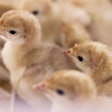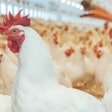Mike McGrew, senior lecturer at The Roslin Institute at the University of Edinburgh, Scotland, U.K., talked to Jenny Hone about the encouraging research they are conducting into preventing the spread of the deadly bird flu virus (avian influenza) in poultry and the regulatory minefield facing gene-edited animals worldwide.
Hone: When did you start looking at the possibility of gene editing in poultry to prevent the spread of bird flu?
McGrew: Helen Sang’s group at The Roslin Institute developed transgenic chickens in 2011 in collaboration with Dr. Laurence Tiley at Cambridge University. These transgenic chickens, while susceptible to avian influenza, did not transmit the virus to co-housed chickens in the same pen. Since that time, the goal of researchers has been to find genetic targets that can be subtly modified to render the chicken resistant to avian influenza. Working with our collaborators, including Professor Wendy Barclay and Dr. Jason Long at Imperial College London, we believe we have now identified one of these targets.
Hone: How are these targets modified?
McGrew: The flu virus depends on cellular proteins to replicate and, therefore, spread from one bird to another. Avian influenza uses a cellular protein called ANP32A (Acidic Nuclear Phosphoprotein 32 Family Member A) to replicate. We discovered that to do this the virus uses a particular part of the ANP32A protein and, more specifically, it needs to interact with a very small segment (just two amino acids) in this part of ANP32A. When we changed these two amino acid residues in the chicken gene for ANP32A the virus was unable to replicate. Hence, the virus will no longer replicate in a genome-edited chicken that contains these specific amino acid changes.
Hone: When can we expect to see the first chickens produced with this genetic change?
McGrew: We have developed a breeding technology to quickly breed chickens that are homozygous (both chromosomes changed) for a desired genetic change. So our first genome edited chicks should hatch in the first half of 2020.
Hone: How many gene-edited chickens will you produce to prove the principle and how many will form the initial breeding flock?
McGrew: The initial test flock will be very small. We perform a mathematical analysis to determine the minimum animal number required to demonstrate a significant protection from flu infection.

Mike McGrew, senior lecturer at The Roslin Institute, expects research to be complete within 3 to 5 years, however, there is no global framework for regulating gene-edited animals, meaning that predicting commercial availability of avian influenza birds remains almost impossible. (Courtesy University of Edinburgh)
Hone: Will this protect against all strains of the virus?
McGrew: This is the crucial parameter that we will test both in chicken cells and in the genome-edited chicken.
Hone: Given that the flu virus can mutate quickly, how long is it likely to be before the virus finds a way to get around these changes?
McGrew: The goal of these projects is to discover the Achilles heel of the virus – a genetic change or weakness that the virus cannot overcome in the host organism. It is possible that two or three genetic changes will be needed for a chicken to be completely resistant to avian influenza.
Ultimately, we need to show that the birds are resistant, and not just resilient, to the virus and to demonstrate that they can clear the infection quickly and not carry it so it doesn’t mutate in the birds or spread to non-gene-edited chickens.
Hone: Is it likely that this gene-editing technique will lead to a trade off with other traits?
McGrew: This is always a possibility so the first experiment we will perform with the genome-edited birds will be to monitor their growth rate and behavior.
Hone: As well as the financial implications, eradicating bird flu also has implications for humans. Just how much of a problem is this?
McGrew: The 2015 avian influenza outbreak in the U.S. led to the slaughter of 50 million poultry and is estimated to have had an economic cost of US$3.2 billion. It is well established that bird flu strains can, though very rarely, become infectious to humans. The results may be very serious with high death rates from infection, but the flu virus does not often spread from person to person.
Hone: How did the collaboration between Imperial College London and The Roslin Institute come about?
McGrew: We have collaborated with Professor Wendy Barclay, Professor Mike Skinner, and Dr Jason Long of UCL for several years after meeting through a separate collaboration and realizing that we have complementary expertise that can be brought together in this research.
Hone: Who will own the rights to the gene-editing technique?
McGrew: The ownership of the Crispr technology is currently being contested between the University of California and MIT. We have filed a patent application for this specific application.
Hone: Cobb-Vantress is contributing to the funding of this project so will the company have sole commercial rights to the technology and when can we expect to see the first avian flu-resistant birds available commercially?
McGrew: Yes, Cobb-Vantress will have the first chance to commercialize the results, but it is impossible to say at this juncture when the first commercial birds will be available. We expect to conclude our research within 3 to 5 years. At this point, we will have thoroughly examined the birds for avian flu resistance and for their health and welfare; if the findings are extremely positive the birds will be ready for commercial production. Certainly we see a demand from farmers and consumers.
However, there is no global framework for regulating gene-edited animals. At the moment, Brazil, Argentina and Australia take a fairly lenient stance on genome-edited animals, but the EU is much more restrictive, categorizing gene editing and GMO as the same, and the U.S. is ambiguous.
Global genetics company Genus, which has bred pigs resistant to porcine reproductive and respiratory syndrome (PRRS) virus, a disease that can cause reproductive failure, reduced growth and early death for the animals, will act as a test case for obtaining regulatory approval in the different global markets. The company is currently seeking regulatory approval in China and the U.S. for its PRRS virus-resistant pigs.
Is the end in sight for avian influenza in the poultry industry?
www.WATTAgNet.com/articles/8943

















